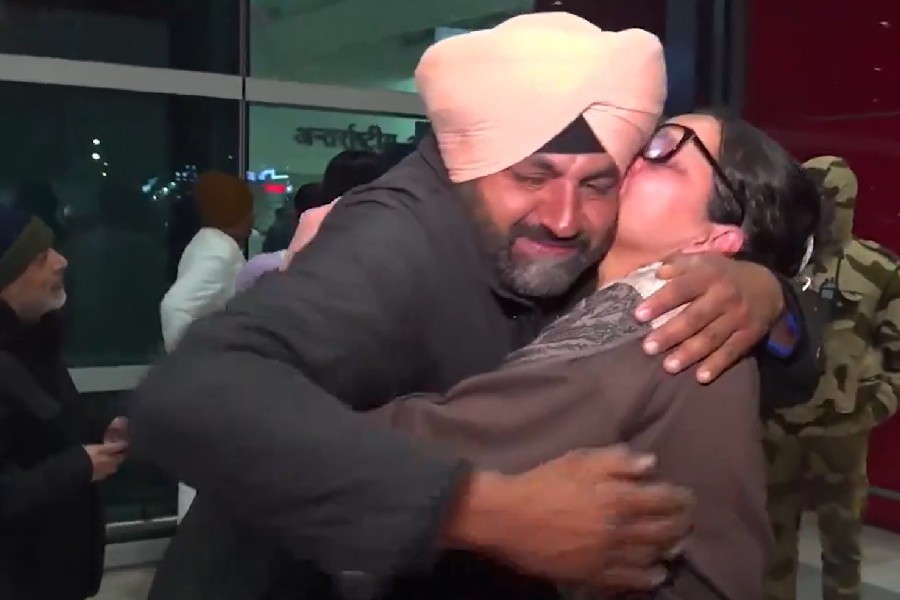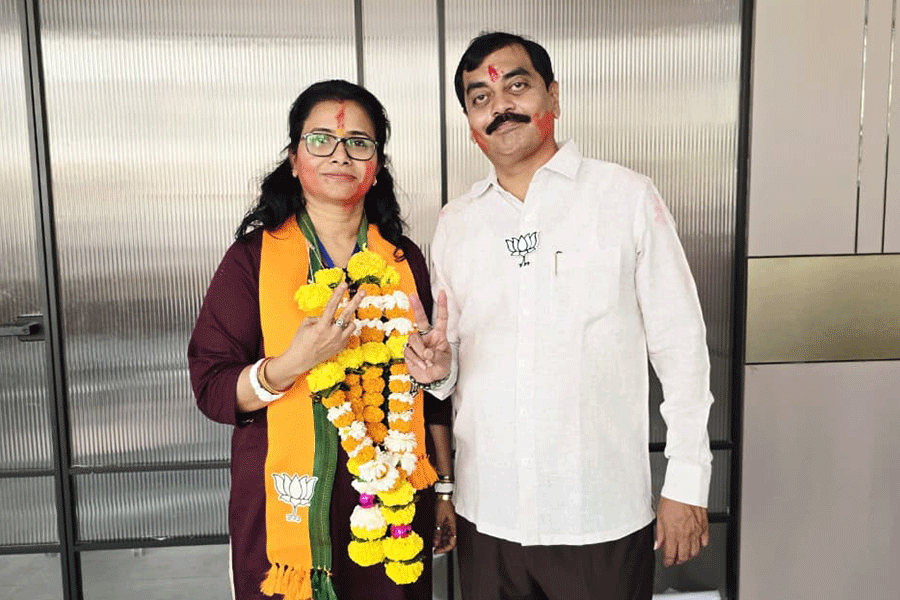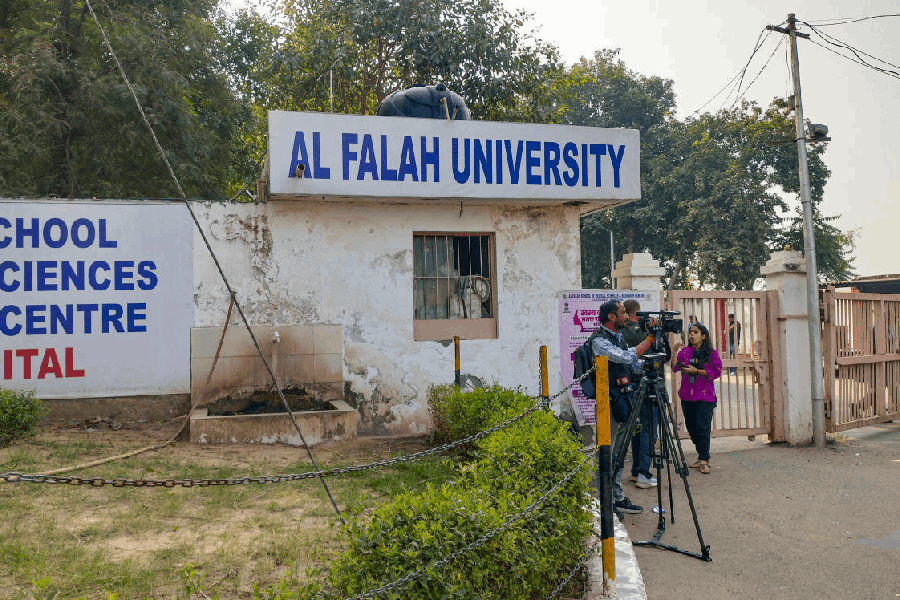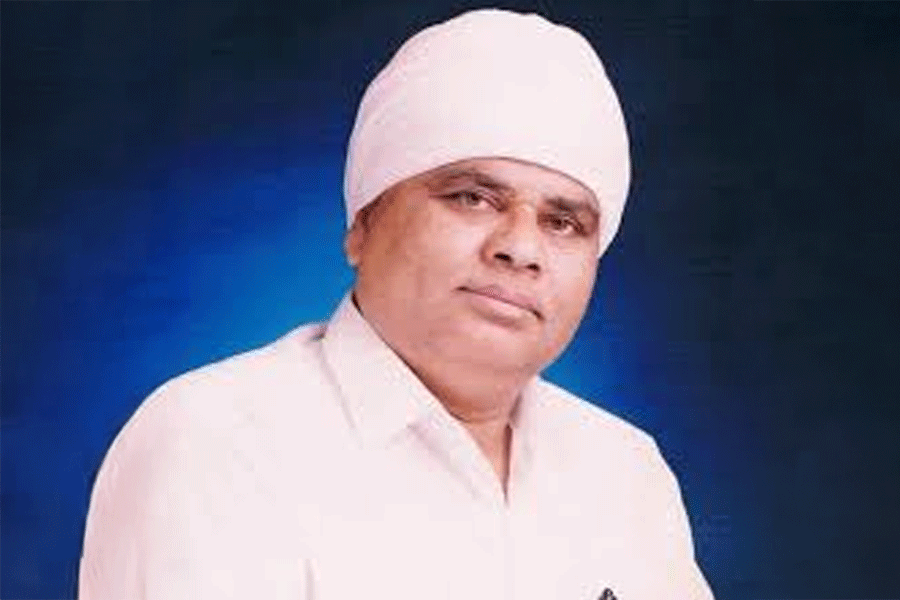.jpg)
A dishevelled Anurag Kashyap sits up reluctantly on a narrow bench in his vanity van. The director is unwell. “I have a throat infection,” he mumbles before a coughing fit makes any conversation impossible.
It’s 3pm on a sunny Mumbai faux winter and t2oS is on the sets of Sacred Games, the Saif Ali Khan-starring web show for Netflix, in a bungalow on Madh Island. The sprawling bungalow is populated with a strange mix of junior artistes who look straight out of a mythological, complete with outlandish crowns and a young technical crew outfitted with walkie-talkies. Across the thin partition in the vanity van, I could hear snatches of the conversation Anurag was having with the actors.
This is Anurag’s 21st year in the movie business. He had his Bollywood debut as a writer in Ram Gopal Varma’s Satya. “But that wasn’t the first time I worked on (a script). Hansal Mehta’s Jayate... never released.”
This year, Anurag also marks 25 years since he moved to Bombay to work in movies. Against all odds, he has become one of Bollywood’s most sought-after filmmakers. In an hour-long chat, punctuated by sips of a ginger-and-honey concoction, we chat about his journey, his standing in the indie community, personal and professional struggles and people’s perception of him.

What are your memories of your early years in Mumbai?
I came to Mumbai in 1993 and I think I started working immediately. I did a lot of uncredited work. I was ready to do any work that paid me. I used to write daily shows or be in the crowd as a junior artiste. Those used to be fun times. I’d walk everywhere. Prithvi (Theatre in Juhu) was my central point. The first year was financially difficult but once I started writing soaps, there was a lot of money coming in. Those were the early days of television and no one could write faster than me. I could write three episodes a day, which was about 100 pages.

I chose to walk away from that money for Satya. All the exciting work I was doing then didn’t pay. The choice was between writing scripts for countdown shows, like Superhit Muqabla, or working on a film. So I’d refuse and my brother (director Abhinav Kashyap) would write those. Ramuji (Ram Gopal Varma) wanted to make a film with Manoj Bajpayee. There was no money in that. He told me he’d pay Rs 10,000 for 10 months. I was just happy that a film like Satya was being put together. Satya was my film school. I would make Ramuji meet new people.

You wrote for Kaun, Shool, Nayak and also Deepa Mehta’s Water. When did you decide that you wanted to direct?
The urge to direct came after I left Mission Kashmir [directed by Vidhu Vinod Chopra] midway. I was very disillusioned. Until then, I had never thought of directing anything. I was almost like first AD (assistant director) on every film I had done. I could work on the first, from beginning to end. I just didn’t know how to make schedules.
I had written an episode for Shivam Nair for Star Bestsellers. When I was rewriting it, I felt like I should direct it. I asked Shivam and he was okay with it. I cast Kay Kay Menon and Nivedita Bhattacharya, whom I knew from Prithvi.
We brought in Natty (cinematographer Natarajan Subramaniam) and a friend from MTV lent us a digital camera. When I look back, I think a lot of things fell in place also because after Satya, Kaun and Shool, the media had written a lot about me. There was a lot of myth about me (laughs).

Everyone who did projects with you back then thought of you as some kind of a wunderkind!
Yeah… which I never understood but took full advantage of! People would constantly ask me if I was ‘that Anurag’. I think that’s how we pulled off making the Last Train to Mahakali because we had no money. We made that episode for free. The episode created quite a storm when it aired. People had not seen anything like it on TV before. It was fully experimental and influenced by Apocalypse Now; except the story, nothing was original. But the impact was so huge that we got a Screen Award for that episode. I leveraged that to make my first film.
At what point in your career did you feel that you didn’t have to struggle to make a film?
Every film has been a bit of a struggle. I had run-ins with the censor board but I still kept making films. Paanch and Black Friday got delayed by the censor board, Grand Hotel and Allwyn Kalicharan got shelved and Gulaal took seven years to release. I started shooting No Smoking even before any (of my) films had released. That’s six films in a space of three-four years. I was constantly working but, yes, I had to fight.
I think, post-Gangs of Wasseypur people stopped questioning my casting choices or how I make movies. The best way to avoid outside interference is to control your budget. The budget of Mukkabaaz is the same as Black Friday. Ugly and Dev D are in the simple-budget bracket. Raman Raghav 2.0, The Girl in Yellow Boots and Gulaal are in a much lower bracket. No Smoking was more expensive and, of course, there was Bombay Velvet.

In these two decades, what’s been the lowest point?
In 2005-06 when No Smoking started shooting. And the second big low was in between the two schedules of Bombay Velvet (2015). They were both personal lows. In 2005-06, nothing was going right — my films weren’t releasing, I was dealing with alcohol and drugs and then, my first divorce happened. I channelled all my frustration into No Smoking.
After the first schedule of Bombay Velvet, Kalki (Koechlin) and I parted ways. And, then Bombay Velvet bombed. The film released on Friday and my divorce happened on Monday. That Monday night, I started writing Raman Raghav 2.0. I am a total survivor. I pull myself out of low points.

You have been very open about your personal life, which is not a norm in the industry. Has that approach been beneficial?
I think it has. Everyone knows everything about me, so there is nothing to hide. Yes, it does get me into controversies once in a while but I think it has helped people to understand me. They know that I am honest and that I am not looking for controversy. The powers that be have also understood this. I was surprised during Mukkabaaz when the film went through the censor board without a hitch. I couldn’t believe how easy it was. They knew that I am not aligned with any party. I have a problem with the system. They don’t see me as someone who is agenda-driven.

Your run-ins with the censor board started with Paanch, which never released. And 17 years later, Mukkabaaz sails through. Considering the political climate today, were you worried while making such a hard-hitting socio-political film?
People have a lot of perceptions about me. One of them is that my films are heavily censored. My most censored film is Bombay Velvet. All of my films have come out of the censor process intact. In Gulaal, two words — ‘Gandhi’ and ‘Ambedkar’ — were cut out. There were no cuts in Ugly, Raman Raghav (2.0), Gangs of Wasseypur, Black Friday or Yellow Boots. Bombay Velvet had cuts because it was a big-budget studio film and they didn’t let me fight for the cuts.
There is a system in place at the censor board that gives them the power to stop my film but also gives me the power to fight and challenge them. I have always used those methods. I fought publicly with the censor board during Paanch because I didn’t understand how the system works. And then there was Pahlaj Nihalani during Udta Punjab. He was just on a power trip.... I wish we didn’t have a censor board because I don’t agree with the concept, but I know how to handle it.

You’ve always made movies that people have told you not to make. Is there a film that you’ve regretted for whatever reason?
Every movie has given me something. With two films, I regret not sticking to what I wanted to make. I tend to make complex films that have a lot of layers. Twice because of budgets and people’s careers riding on the film, I went against my instinct and simplified both No Smoking and Bombay Velvet. With Mukkabaaz, also, there was a lot of pressure to simplify but I stuck to my guns. Long is not the length of a film but how it feels when you are watching it. Gangs of Wasseypur with all its details didn’t feel long.
The emotion of anger is a common thread through your films. Now that you are successful and removed from the daily grind of the common man, what fuels your anger?
I don’t know. I just react to things around me. Inside of my heart is Harishchandra Ghat (according to mythology, the eternal fire that Harishchandra lit is still burning at this ghat in Varanasi).

Also, over the years, your relationship with the indie film community has gone through more than its share of ups and downs. They once saw you as their poster boy. Then they attacked you when they thought you had sold out. There’s an uneasy truce at the moment. Do you feel they have unfairly judged you?
I don’t feel like a victim. It’s their weakness that they saw me as a poster boy. I never fought for them. I was fighting for my own films. I wasn’t a warrior fighting on their behalf. I genuinely supported other films because of my love for cinema. I didn’t like the adulation.
When I shut down my production house I was accused of selling out, but the company wasn’t serving its purpose. It was meant to be a non-profit-making organisation that helped filmmakers. I didn’t take a penny. But it became a battleground of egos. So I walked away. The same thing happened when decades ago at Prithvi people started tearing down those who had made it.
The indie community was busy pulling each other down while none of their films was making a mark at the box office. Like the success of Sairat has isolated its director Nagraj (Manjule). It’s always been like this. I came to Mumbai to make films and nothing is going to stop me from making films. That’s what I like about Ramuji. We might not want what he is making but that hasn’t stopped him from making movies.
From Nawazuddin Siddiqui to Varun Grover and Amit Trivedi, you have also given the industry a lot of fresh talent over the years.
I can’t afford them after they have become stars! My films have to be affordable and I don’t want to be unfair to someone who thinks they are worth more. If an actor’s fee imbalances my film, I find someone else. The only reason I have continued working with Nawaz is that he never talks to me about money. We only talk about the film. When making Raman Raghav (2.0), we had no money and Nawaz really helped. Vicky (Kaushal) had only done one film but his representatives were talking about his market rate.
I get messages from my old actors asking me when I am making a movie with them and I am very honest. I tell them that I can’t afford them. My films have the same budget as those in the ’90s but the actors’ lives have changed. They need five-star hotel rooms and plush vanity vans. I can’t give them that. I shot Mukkabaaz in the ghats and that’s where all of us lived. Nawaz and Radhika Apte are two actors who have never complained.
[By the time we finish the conversation, Anurag is ready to call it a day. His mood perks up when an assistant tells him there’s no shoot for the next two days. We take the public ferry back to the mainland from Madh Island. Our conversation about Hollywood’s #MeToo movement and the Aziz Ansari allegation is interrupted by fans asking for a quick selfie. A junior artiste on the ferry comes over to say hello.
Once on the other side, we walk through the bylanes of Versova’s fishing village. “I have always lived here. I have even shot films here,” he says, pointing to a space close to a small vegetable market. When he is showing me where a scene from Raman Raghav 2.0 was shot, someone catches his eye. A young man, dressed in all blue, greets him. His name is Prince. He is an actor from Gurgaon. “You have a nice presence. Meet my casting director,” Anurag tells Prince before walking into his building.]
— Karishma Upadhyay
Which Anurag Kashyap film has stirred you the most? Tell t2@abp.in

.jpg)








